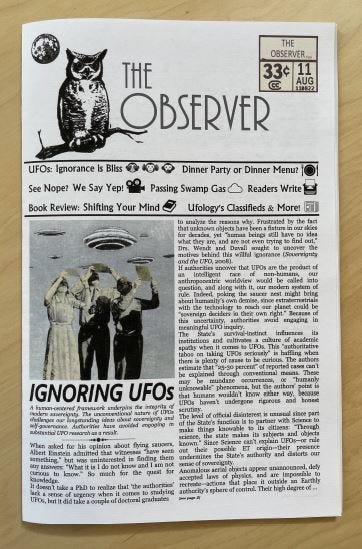Project Mindshift
Has the American Public been re-educated concerning extraterrestrial life?
Project Mindshift: The Re-education of the American Public Concerning Extraterrestrial Life 1947-1997 is Michael Mannion’s exploration into the government’s ability to keep a secret while simultaneously managing its release. His “Mindshift Hypothesis” states that “our world has been and is now being visited by advanced intelligent entities from elsewhere, and this reality has been known to a limited number of people within the U.S. government since at least 1947.” While this premise has most UFO believers nodding in agreement, Mannion takes the scenario a step further. Realizing that the secret couldn’t be kept forever, he proposes that officials began a psychological operation “to prepare the American public to be able to accept the reality of extraterrestrial life.”
The book speculates about whether elements within the government have leveraged mass media to mold popular opinion. Mannion illustrates how television and movies have pushed propaganda since their inception and argues that they continue to have “a large role in both shaping and reflecting the development of public attitudes toward UFOs and extraterrestrial life.”
He provides Steven Spielberg as an example of someone with no background in UFOs who managed to make successful films about off-world entities coming to our planet. Classics like ET and Close Encounters depict these beings as benevolent—not as a race of cosmic conquerors. Could these placid portrayals be part of a larger plot designed to reduce people’s fear about the alien presence?
The most intriguing portion of the book comes during Mannion’s interviews with ufology’s leading figures at the time—“the Mindshifters” as he calls them. When asked what they thought about his hypothesis, instead of a diverse set of answers, the respondents sounded like they were reading from the same script.
Most dismissed the idea that there was a government-sponsored effort to educate the public about aliens. Astronaut Edgar Mitchell doubted it, believing the movement to reveal the truth about ETs was a citizens’ crusade. Ufologist Stanton Friedman agreed: “If the government is trying to program us, they are sure doing a lousy job.” Abduction aficionados Budd Hopkins (“I don’t see any evidence for it”), Dr. David Jacobs (“I don’t think government is that clever or that powerful”), and Dr. John Mack (“I don’t think there has been a campaign”) all rejected it as well. Roswell researcher Don Berliner kept in step with his peers, concurring that he “[didn’t] see any real evidence for a campaign.”
Out of this esteemed group of ufological voices, only Ray Fowler and Michael Lindemann stood apart with measured replies to the Mindshift Hypothesis.
Fowler was non-committal, supposing that a scheme to tweak public sentiment toward ETs could be occurring.
Lindemann was more tolerant, insisting that any government worth its salt would slowly introduce their citizens to the existence of intelligent ETs. He refers to their technique as “psychic numbing,” and credits the approach as the only responsible one for a government trying to prepare society for a world-changing revelation. As he sees it, when aliens eventually land on the White House lawn, the authorities want people to shrug their shoulders and proclaim: “We knew that. This is not news. This doesn’t change anything.”
Despite leaving the door open to the possibility that the government directs the flow of UFO information, both researchers stopped short of suggesting it was actually happening.
The like-minded reactions from ufology’s elite are curious. Here was a group of individuals known for holding many different interpretations about the phenomenon—a group who, at times, made a living off of disagreeing with one another’s conclusions—collectively aligning against Mannion’s hypothesis. Why might they all disagree with the notion that a shadowy cabal is leaking info about aliens into the mainstream?
Is it because this line of reasoning implicates them as pawns in a larger game of deception? If an effort were underway to shape the national mindset regarding ETs, a ‘respected’ member of the UFO community would make an excellent mark to carry the intended message. This scenario is an uncomfortable prospect to researchers who build narratives based on insider information and government sources.
It’s also possible that some of the personalities on the UFO circuit are part of the official charade, directly employed as agents of the government. This alternative is easy to imagine in a field that has very low barriers to entry and rarely checks credentials.
In any case, the fact that most discounted the theory might have more to do with their fear of being wrong than anything else. Their unique perspectives on various aspects of the UFO enigma have helped them sell books, videos, and tickets to lectures. If the Mindshift Hypothesis proves to be accurate, it would threaten many personal brands of ufology.
Mannion’s thought-experiment didn’t resonate with ufologists in 1998, but the idea hasn’t gone away. Lunar anomaly investigator and author Mike Bara believes an element of the “Mindshift” is currently taking place, telling The Sun that he’s skeptical about the Navy’s recently declassified “UFO” footage. “The military wants you to think these might be alien spacecraft,” said Bara. “Why is this narrative … being pushed?” He believes the objects have earthly explanations and sees the ET angle as part of a hidden government agenda. “They’re covering up for something else that might be going on.”
While Bara differs on the specifics, his speculation supports Mindshift’s main contention. As UFO rhetoric accelerates in the media and on Capitol Hill, maybe we are finally witnessing the culmination of Mannion’s “Hypothesis.”
Make way for arrival.











It's an interesting hypothesis, and I wouldn't doubt that something of the sort is going on—although to what extent, who can say? It's just a shame that the government is so duplicitous and untrustworthy that we have to second guess everything it says.